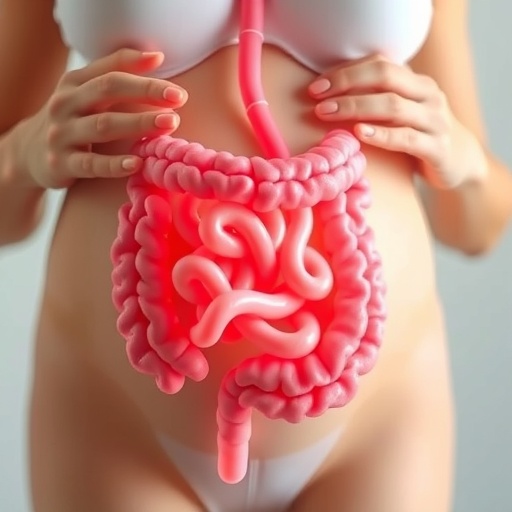Groundbreaking discoveries from the University of Cambridge have unveiled a profound link between maternal gut bacteria and placental hormonal regulation, revealing how the microbiome silently governs pregnancy outcomes. This pioneering research highlights the bacterium Bifidobacterium breve as a key influencer in placental function, dramatically affecting fetal health and survival in mouse models. By elucidating this intricate gut-placenta axis, the study promises revolutionary pathways for prenatal care aimed at reducing pregnancy complications through microbiome modulation.
Within the meticulously controlled environment of a murine model, researchers compared pregnant mice devoid of gut microbes with counterparts harboring the Bifidobacterium breve strain. The stark contrast between these groups underlined the protective role of this commensal bacterium. Mice lacking B. breve suffered significantly higher rates of fetal growth restriction, hypoglycemia in fetuses, and pregnancy loss. These pathologies underscore the bacterium’s pivotal role in orchestrating the maternal-fetal interface, particularly through its influence on placental hormone synthesis.
The placenta, often overlooked after childbirth, emerges here as a central organ finely tuned by maternal gut microbiota. Through sophisticated proteomic analysis, the study identified alterations in over 400 placental proteins engaged in upwards of 150 biological processes contingent on the presence of B. breve. Notably, placentas from colonized mice exhibited enhanced nutrient transport capacities, including improved uptake of amino acids and lactate, critical substrates that fuel fetal development. This functional enhancement was coupled with elevated secretion of pregnancy-supportive hormones such as prolactins and pregnancy-specific glycoproteins, hormones essential for maintaining gestational homeostasis.
This investigation is the first to provide compelling experimental evidence linking the gut microbiome to placental endocrine functionality. It thus expands our understanding of pregnancy biology by integrating the gut microbiota as a remote, yet decisive organ system influencing in utero development. The research harnessed germ-free mouse models to disentangle the direct effects of B. breve from other environmental and metabolic confounders, bolstering the causative inference of these microbial influences.
Emerging from this discovery is the tantalizing prospect of leveraging probiotics as prenatal therapeutics. Given that B. breve naturally colonizes the human gut, yet fluctuates in abundance with factors such as stress and obesity, modulating its levels could become a non-invasive strategy to boost placental function. This approach challenges the existing paradigm of pregnancy management, steering towards microbiome-centered interventions designed to prevent gestational diabetes, preeclampsia, miscarriage, and adverse fetal outcomes.
The research team emphasized that the maternal gut microbiome acts as a remote controller of the placenta, influencing a vast proteomic landscape that dictates not only nutrient exchange but also the hormonal milieu necessary for sustaining pregnancy. This mechanistic insight elevates the microbiota from a passive passenger to a dynamic regulator of fetal growth and survival, opening new vistas for diagnostic biomarkers and therapeutic targets during gestation.
Of particular significance is the methodical use of an experimental mouse model with defined microbial status, enabling precise delineation of B. breve effects. This controlled model eliminates confounding influences inherent in human studies, such as diet variability, activity level, and complex microbial interactions, providing a robust platform to investigate maternal-fetal microbial crosstalk and its consequences.
The clinical implications of these findings are profound. Low birth weight and fetal growth restriction affect up to 10% of first-time mothers globally and are associated with increased risks for neurological and psychiatric disorders spanning from cerebral palsy to schizophrenia later in life. By uncovering a microbiome-dependent mechanism that supports placental nutrient and hormone regulation, this study lays the foundational groundwork for innovative prophylactic interventions aimed at improving lifelong health trajectories.
Experts involved in the study highlighted the transformative potential of their work. Dr. Jorge Lopez Tello, the lead author, articulated the vision that regular screening of the maternal gut microbiome could become a standard prenatal assessment, enabling early detection and correction of microbiota imbalances deleterious to pregnancy. Furthermore, the utilization of probiotics tailored to increase B. breve levels might provide a safer alternative to traditional pharmacological treatments, reducing maternal and fetal risk while enhancing wellbeing.
In line with this, Professor Amanda Sferruzzi-Perri and Professor Lindsay Hall underscored the multidisciplinary synergy between developmental physiology and microbiology that propelled the study. They foresee a future where beneficial microbes such as Bifidobacterium not only bolster gut and immune health but also actively participate in complex endocrine regulation essential for pregnancy success. This paradigm shift heralds a new era in maternal-fetal medicine interfacing microbiome science with obstetrics.
Future investigations will endeavor to translate these murine findings into human clinical contexts, exploring how Bifidobacterium breve interacts within the intricate network of the human gut microbiome and impacts placental function. The challenge remains to comprehensively map microbial influences without perturbing systemic homeostasis, ensuring that probiotic interventions are both efficacious and safe for mother and child.
This seminal work, published in the Journal of Translational Medicine, represents a landmark advancement in understanding how maternal microbiota can remotely dictate placental biology and pregnancy outcomes. As research progresses, the prospect of fine-tuning the maternal microbiome to foster healthier pregnancies promises to reshape prenatal care, offering hope for reducing pregnancy-related morbidity and optimizing neonatal health on a global scale.
Subject of Research: Animals
Article Title: Placental endocrine function is controlled by maternal gut Bifidobacterium in germ-free mice
News Publication Date: 6-Oct-2025
Web References: 10.1186/s12967-025-07198-4
Image Credits: Jorge Lopez-Tello / University of Cambridge
Keywords: Gut microbiome, Bifidobacterium breve, placenta, pregnancy hormones, fetal growth restriction, probiotics, maternal-fetal health, microbiota influence, pregnancy complications, placental function, gestational health, developmental biology




